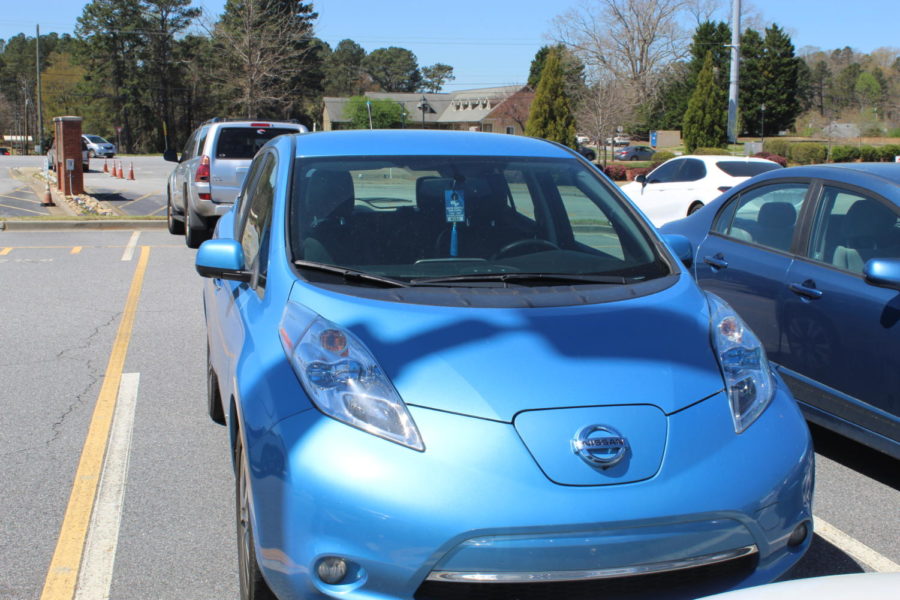Changing our perspective of electric vehicles
Revving up. Electric cars are rising in popularity due to convenience and environmental concerns. Several South students and teachers have used these vehicles for many years and urge others to do the same. “I tell everyone to switch to an EV! I love it and will never drive a gas car again,” says Ms. Graham.
April 14, 2021
With climate change becoming an increasingly concerning problem for the world, 69% of Americans think the government isn’t doing enough to combat climate change. While things such as rejoining the Paris Climate Accord are a step in the right direction, a factor our government has neglected to consider is growth in electric vehicles (EVs). According to the EPA, motor vehicles collectively cause 75 percent of carbon monoxide pollution in the U.S. With this data in mind, it’s shocking to hear that even one electric car switch can stop an average of 1.5 million grams of carbon dioxide from entering the atmosphere. However, the attitude our government has towards these vehicles seems nonchalant at best.
Although electric vehicles have been around for over seventy years, several companies have only recently started the shift to producing more and more electric vehicles and minimizing the role gasoline plays in their vehicles. However, the American people don’t seem to be wanting this shift; according to an AP article, “only 4% of adults with a driver’s license planned to acquire an EV the next time they buy a vehicle.” Conversely, Europe faced a 137% increase in plug-in vehicle registrations last year. In addition, Ford plans on all European articles by 2030 to be electric.
The vast differences in these numbers are a direct result of the government’s attitude towards EVs in both areas of the world. Recent analysis shows that the U.S. has been lagging behind the European Union (EU) in terms of environmental protections, and these are the same laws that pushed European motor companies to shift towards producing more EVs.
This lag is more prevalent than ever in Georgia, which requires citizens who operate an electric vehicle to pay an annual fee of over 200 dollars in order to make up for their lack of a gas tax. This fee further contributes to the overall attitude that seems to be plaguing the country when it comes to electric vehicles: they’re too expensive to be viable. A consumer reports survey showed that price and range were the two biggest factors when it came to dissuading people from buying electric vehicles, with 43% of respondents claiming the former. Instead of doing their best to lower these prices, however, the government seems to be adding on to them instead.
“The alternative tax seems redundant because the source of energy for most electrical cars is heavily abundant, and can always change into something more sustainable,” argues sophomore Saanvi Mudpa, who owns an electric vehicle. “On the other hand, gasoline made from petroleum is a non-renewable source that’s expected to run out over the next few years if oil consumption doesn’t decrease,” she adds.
Furthermore, governments in Europe have been able to slash the cost of EVs to be cheaper to maintain than traditional vehicles through direct incentives and subsidies. On the other hand, according to a My EV article, Georgia tacks itself onto the list of 17 other U.S. states that charge a fee to operate an electrical vehicle; there was even a proposed $1000 dollar registration fee in Illinois. They claim to be doing this in order to make up for the lost funds from gas taxes that would then help infrastructure. However, this same problem can be solved by basing registration fees on a vehicle’s weight or a mileage tax, as those are both other contributing factors to infrastructure damage. These would help alleviate the gas tax deficit while still promoting a positive attitude towards EVs. Even the Biden Administrations Secretary of Transportation, Pete Buttigeg, has spoken about how this solution would be both economically and environmentally feasible.
While senior Sunskar Tiwari understands the need to make up for the gas deficit, he fears that blaming EVs for it will reduce the public’s likelihood of buying one.
“In terms of economics, it makes sense that if you are going to tax gas, then you have to generate income for the nation and tax EVs as well… however, since electrical cars are better for the environment in the long run, there should be some benefits provided as well to incentivize people to switch to electric vehicles,” he states.
In addition, Ms. Graham, a statistics teacher here at South, reflected on how owning an electric car has improved her quality of life, and gave several tips on how to deal with them.
“The EV annual fee charged when I renew my tag is somewhat annoying but again, it is a minor inconvenience compared to all of the benefits,” she explains, “There are also a couple of things to think about like when you get where you are going is there a charging station. Many hotels now have destination chargers and we have learned which hotels have them. It is not an inconvenience because there are apps that help you plan your trip and tell you these things, it is just a matter of learning how and when to use the apps.”
Of course, Electric cars are in no way perfect. They have other logistical issues whether it be the lack of charging stations, range, or price. However, they remain an important step in steering the world to be a cleaner place, and their imperfections will only get better once companies have incentives and further research into them. The range of electric cars is already much higher than that of the past, and will soon be at par with that of motor vehicles. With all this in mind, our government needs to stop penalizing EV owners and instead give both our citizens and companies reasons to support this vital industry.
Disclaimer: The opinions expressed in this piece belong solely to their respective author(s). They do not represent the opinions of South Forsyth High School or Forsyth County Schools.





